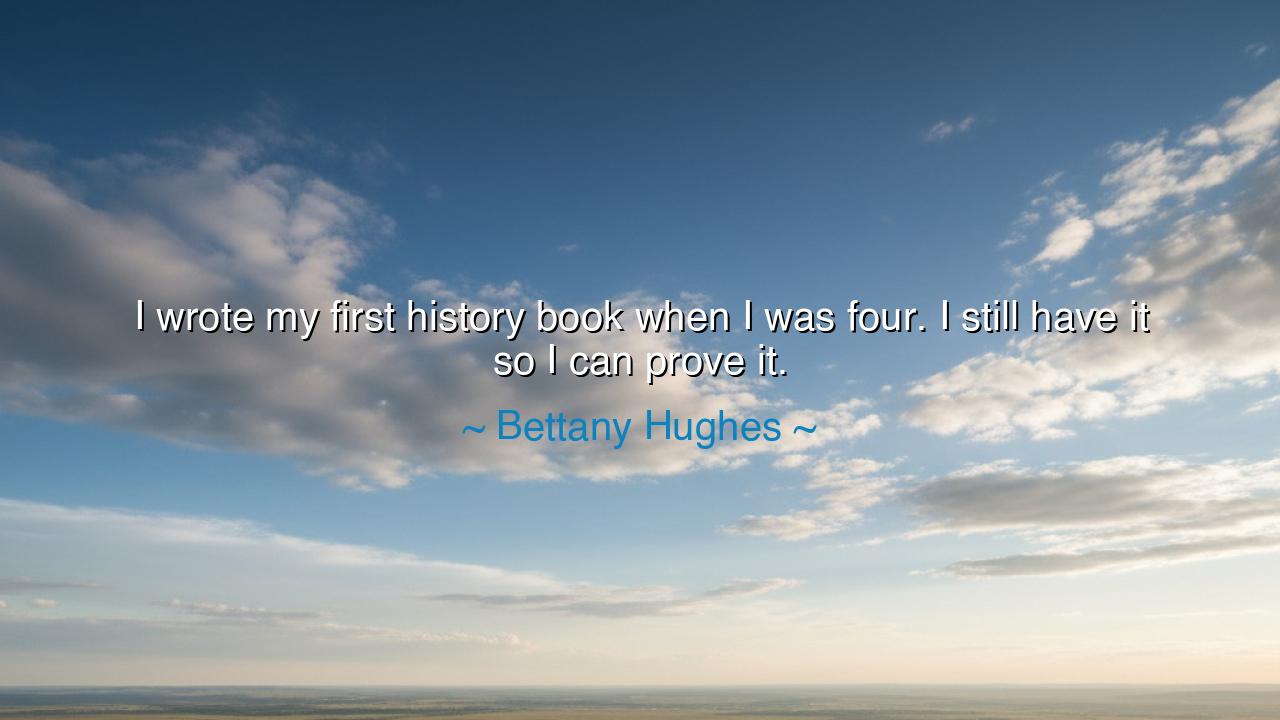
I wrote my first history book when I was four. I still have it so






Bettany Hughes, a seeker of the past and a teller of humanity’s grandest stories, once declared: “I wrote my first history book when I was four. I still have it so I can prove it.” What seems at first a simple recollection of childhood is, in truth, a testament to destiny. Within those words lies the fire of innate calling, the whisper of a spirit that knows its path long before the world names it. When a soul is born with a purpose, it begins its work even before understanding the weight of what it does. The child who scribbles with wonder may one day become the sage who illuminates the ages.
From the beginning of time, the seeds of greatness have been sown early, though few recognize them as such. Bettany’s words remind us that passion is not learned — it is remembered. The spark that drives the historian, the artist, the inventor, or the poet, often flickers in the dawn of youth. It is not the product of chance or convenience, but the echo of something ancient and essential within the soul. Thus, her “first history book” is not merely a child’s play, but a symbol of purpose awakening — a reminder that what we are meant to do often reveals itself long before we understand its meaning.
Consider the tale of Wolfgang Amadeus Mozart, who, at five years old, composed his first musical piece — clumsy perhaps to adult ears, but divine in its foreshadowing. He was not taught to be Mozart; he simply became what he already was. Like Bettany, who at four sought to capture the flow of time upon paper, he followed the thread of his own inner nature. Their stories teach us that the gifts within us are not given in fragments; they are whole from the beginning, waiting only for recognition and nurture. To deny them is to silence a part of eternity speaking through us.
Bettany Hughes’s life itself reflects this truth. She grew to become a historian of civilizations, a storyteller of gods and mortals, breathing life into the ruins of Troy, Athens, and Rome. Her childhood book, kept safe through the years, stands as a token of continuity — a bridge between the wonder of innocence and the wisdom of maturity. It is proof that the dreams of youth, when honored and preserved, can become the pillars of one’s destiny. The hand that once drew simple shapes of heroes and kings became the same hand that penned the histories of empires.
Yet, how many among us have forgotten the whispers of our own beginnings? How many have buried their childhood wonder beneath the noise of adulthood? Bettany’s quote is a gentle command to remember who we were before the world told us who to be. The things we loved, the questions that stirred our hearts, the stories that made us ache with curiosity — these are the golden threads leading back to our purpose. The historian who guards her first book reminds us: do not discard the evidence of your earliest fire. Keep it close, for it may one day be the proof of who you were always meant to become.
In ancient times, the philosopher Plato spoke of the soul as a being that forgets its divine origin upon birth and must spend its life remembering. Bettany’s story is a reflection of this teaching — the act of remembering the soul’s purpose through the passions of youth. When she says she “still has it so I can prove it,” she is not boasting; she is declaring victory over forgetfulness. She has kept her soul intact. She has honored the child within, and through that fidelity, she has found the voice that speaks to millions.
So, my child of time, take this as your lesson: within your earliest joys and curiosities lie the map to your destiny. Seek out the fragments of your childhood passions — the drawings, the stories, the questions that once set your mind ablaze. Do not dismiss them as folly; they are your proof, as Bettany’s book was hers. Tend to them as sacred relics, for they are your first dialogue with eternity.
And when you find yourself lost in the labyrinth of modern striving, return to that first flame. Let it remind you who you are and what your heart has always sought. For the soul that honors its beginnings will never be without direction, and its life — like Bettany’s — will become both a record of history and a testament of truth.






AAdministratorAdministrator
Welcome, honored guests. Please leave a comment, we will respond soon